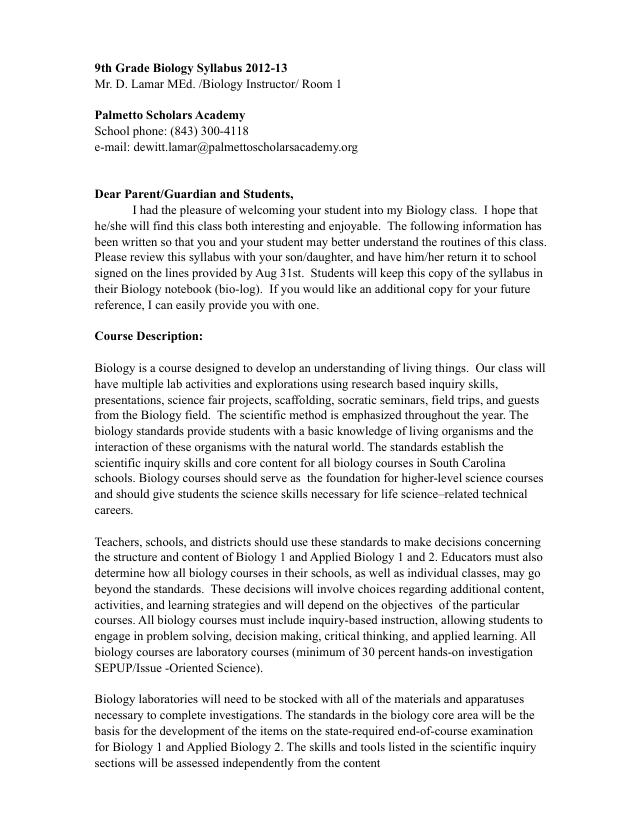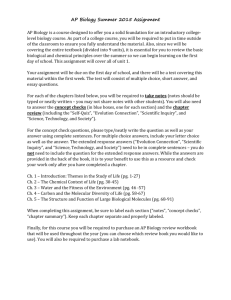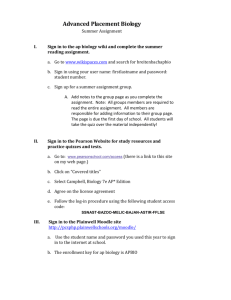9th Grade Biology Syllabus 2012-13 Mr. D. Lamar MEd. /Biology
advertisement

9th Grade Biology Syllabus 2012-13 Mr. D. Lamar MEd. /Biology Instructor/ Room 1 Palmetto Scholars Academy School phone: (843) 300-4118 e-mail: dewitt.lamar@palmettoscholarsacademy.org Dear Parent/Guardian and Students, I had the pleasure of welcoming your student into my Biology class. I hope that he/she will find this class both interesting and enjoyable. The following information has been written so that you and your student may better understand the routines of this class. Please review this syllabus with your son/daughter, and have him/her return it to school signed on the lines provided by Aug 31st. Students will keep this copy of the syllabus in their Biology notebook (bio-log). If you would like an additional copy for your future reference, I can easily provide you with one. Course Description: Biology is a course designed to develop an understanding of living things. Our class will have multiple lab activities and explorations using research based inquiry skills, presentations, science fair projects, scaffolding, socratic seminars, field trips, and guests from the Biology field. The scientific method is emphasized throughout the year. The biology standards provide students with a basic knowledge of living organisms and the interaction of these organisms with the natural world. The standards establish the scientific inquiry skills and core content for all biology courses in South Carolina schools. Biology courses should serve as the foundation for higher-level science courses and should give students the science skills necessary for life science–related technical careers. Teachers, schools, and districts should use these standards to make decisions concerning the structure and content of Biology 1 and Applied Biology 1 and 2. Educators must also determine how all biology courses in their schools, as well as individual classes, may go beyond the standards. These decisions will involve choices regarding additional content, activities, and learning strategies and will depend on the objectives of the particular courses. All biology courses must include inquiry-based instruction, allowing students to engage in problem solving, decision making, critical thinking, and applied learning. All biology courses are laboratory courses (minimum of 30 percent hands-on investigation SEPUP/Issue -Oriented Science). Biology laboratories will need to be stocked with all of the materials and apparatuses necessary to complete investigations. The standards in the biology core area will be the basis for the development of the items on the state-required end-of-course examination for Biology 1 and Applied Biology 2. The skills and tools listed in the scientific inquiry sections will be assessed independently from the content knowledge in the respective grade or high school core area under which they are listed. Moreover, scientific inquiry standards and indicators will be assessed cumulatively. Therefore, as students progress through the grade levels, they are responsible for the scientific inquiry indicators—including a knowledge of the use of tools—in all their earlier grades. Methodology/Instructional Design: All biology students will conduct a comprehensive and deductive inquiry based course which challenges the mind. Conceptual knowledge will be a key focal point in attaining the ideals within all subjects areas in Biology. This course is designed to utilize hands on activities, deductive reasoning, on-sight learning, shadowing, class discussion, lecture, and presentation skills. Delving Deeper Language of the discipline: Students will learn key terms through investigative inquires with in the discipline of Biology. Investigations will include, diseases, cancer research, microbial transmission, and evolutionary inquiry. Rules: Students will learn the principles of scientific inquiry through investigations designed by Sepup Biology. Ethics: Students will exercise the ability to have ethical conversations when working with lab partners during deductive reasoning and socratic seminar activities on topics such as: The Evolution of Man and The Creation of Life. Trends and Details: Students will connect real world scenarios to the classroom. Example: The spread of the H1N1 virus and its containment/prevention strategies. Supporting Complex Thinking and Interdisciplinary Connections Multiple Perspectives: Students will conduct experiments and create modifications to expand knowledge. Across Disciplines: Students will use strategies from all disciplines to input and output information to the classroom within inquiry based lessons. Computer Skills, English skills, and STEM recognition are some examples. Habits of Mind: Creating, imagining, innovating: Students will use these skills to complete and expand on experiments, investigations, science fair projects, and in lab reports. Striving for accuracy: 100% factual information is to be utilized for lab reports, tests, inquiries, article readings, and socratic seminars. Questioning a posing problems: Socratic Seminars will be used to provide investigative question and answer sessions to clarify topics before testing or closing a unit. Thinking flexibly: Students must think outside of the box to expand their knowledge of discussed topics. Redesigning experiments to attain a different perspective is paramount. Outcomes: KNOW: All Biological standards and key terms. UNDERSTAND: Biological concepts such as genetics and evolution DO: Students will work independently and cooperatively to complete inquires and experiments. Learners are expected to: • Complete all assignments. • Participate and actively engage in discussions with fellow learners while contributing to the social construction of knowledge. • Be self-directed and self-motivated. • Ask for assistance when they need it. Technical Requirements • Word Processor • Internet service provider • E-mail Biological Science Scope and Sequence Unit Themes (subject to change): * biodiversity/classification * genetics * cells & cellular processes * ecology & evolution * biochemistry * microbiology Required Materials: * Students should come to class with their textbook, planner, Biology Notebook, loose-leaf paper, and a pencil each day. * Students should bring completed homework when assigned. * Students should keep all their science papers in a 3-ring notebook with dividers which they will need to have in class every day. * Students will need a jump/flash drive/memory stick for computer work. Materials Provided from PSA: SEPUP Lab Aids and Biology Textbook. Classroom Expectations: • Students are expected to be in their seat and ready when the bell rings. • Materials (textbook, pencil, paper, and notebook) must be brought to class each day. If you do not bring needed materials to class you will be sent to your locker to get them and will also receive a tardy if you are not in the room when the bell rings. • The laboratory or room must be clean at the end of the period before leaving. • Treat everyone with respect. • Follow the instructions gives by teacher or lesson. • All school rules will be followed as stated in the student handbook. • All safety rules as stated in the Science Safety Agreement must be followed. You must sign and return in order to participate in labs. Keys for Success in Biology • Have a positive attitude! • I am here to help you succeed, so feel free to ask me for help. I am available before and after school in my room • Ask lots of questions. If you are unclear about something from the textbook, lab, or from discussion, ask. • Make sure that you understand how the lecture, homework, and labs interrelate. Labs and homework are designed to reinforce significant ideas from the text. Make sure that you see these connections. • Start studying for tests early. By studying and reviewing each night you are not only helping to prepare for the test more effectively, you are also more prepared for class each day and any quizzes that may be given. Requested Materials: * Package of loose leaf paper and #2 pencils for your student to keep at home or in his/her locker to use as needed. * Package of color pencils/markers, small school scissors, ruler, glue, red checking pencil/pen etc. to be brought to class when requested. Daily Work, Homework, Exams: * Daily work is very important. If a student comes to class regularly, and honestly attempts to complete all assigned work, he/she will not fail this class. * Bio-Log: Notes, activity sheets, observations of experiments and demonstrations, homework assignments, quiz and test papers, etc. are to be kept organized into the student's biology notebook. All pages should be titled and dated and the Biology notebook is to be kept organized at all times. Students will be asked to turn their log in periodically for a grade. * Homework will be assigned frequently, but not every night. You may read from your book/on-line text, or listen to the reading at the website. Note-taking is STRONGLY encouraged! * Projects: Students will be given ample notice and sufficient time to complete larger assignments such as the insect biodiversity collection, research projects, or other larger projects, as well as the quarterly Biology Current Event Reports and E.O. Wilson Projects. * Tests: Quizzes will be given periodically and an exam will be given at the end of each unit. Should your student do poorly on an exam, he/she may correct it for additional credit. See Q & A sheet for details. Absences: A student with an excused absence will be allowed to make up missed assignments without penalty. However, he/she will only be granted time to complete make-up work equal to the number of days absent, and it is the student's responsibility to request and complete make-up work. If you miss Biology due to a school related activity, but are at school for part of the day, work will be assigned/due with the rest of the class. Please see me before/after school to turn in work/ pick up assignments. Those students with UN-excused absences are not eligible to receive credit for make-up work. Late Work: All assignments must be completed and turned in on time. If a student fails to turn in an assignment on time, he/she is still required to complete the work in order to be eligible for any extra-credit points, but limited or no credit will be given for late work. Progress reports will be sent home 2 or more times each quarter and any incomplete assignments on a given progress report not completed and submitted with an excuse form with-in one week will be recorded as a zero. Labs and Group Activities: Science labs and activities can be very exciting, and so everyone will want to participate. Safety is a top priority in a science classroom, and for this reason participation will be based on proper behavior (following directions, exercising caution and good judgment, etc.). For safety reasons, all student materials and belongings must fit on or under their desks not in the aisles. Safety equipment will be provided by PSA. Grading Procedure: Students will be graded on a total points system. Letter grades will be assigned according to the following scale: 93 - 100 = A 85 - 92 = B 77 - 84 = C 70 - 76 = D 69 and below = F Final grades will be determined by the total number of points earned by the student divided by the total number of points possible. Again daily work will count heavily in your student's final grade. Students are expected to do their own work. Copying or plagiarizing someone else’s work, or letting someone copy yours, will result in a zero on that assignment and could lead to further disciplinary consequences. You are to behave in a way that demonstrates respect for yourselves, others, your environment, and your teacher. Please cut and return to Mr. Lamar -----------------------------------------------------------------------------------------------------------I have read and understand the Biology Syllabus that has been provided to me: ___________________________ Parent phone # _______________________________ Mr. D. Lamar M.Ed. ___________________________ Parent/Guardian Signature _______________________________ Student Signature






